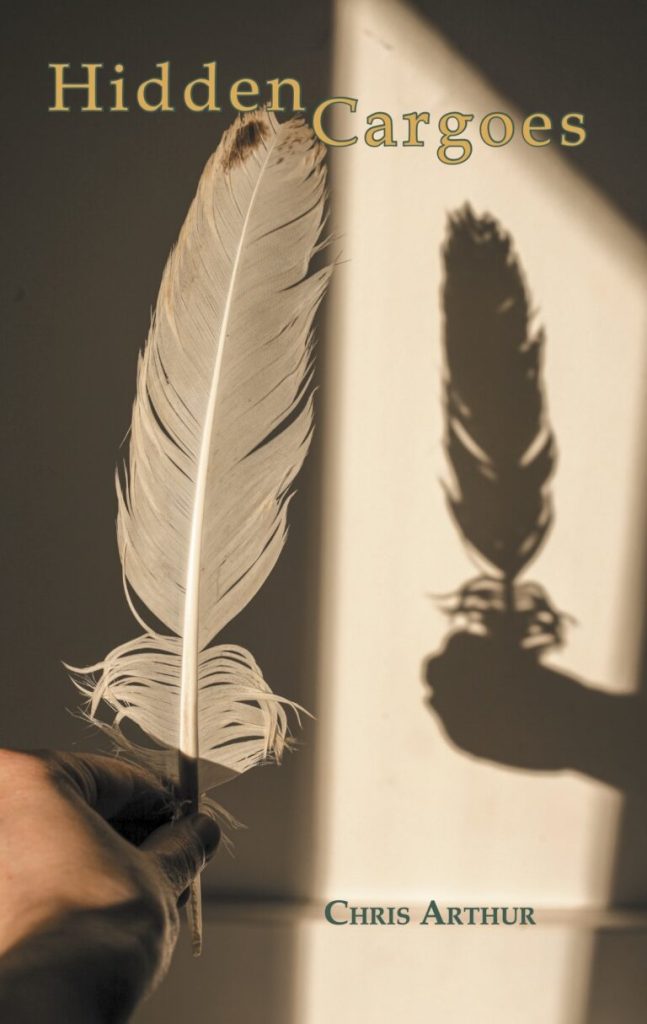Hidden Cargoes
Chris Arthur
(Eastover Press, 2022; pbk, £16.99)
A prolific essayist, Chris Arthur’s writing is marked invariably by an expansive curiosity, an omnivorous reading life and spooling philosophical enquiries that begin with an attentiveness to the ordinary. His finely wrought essays are what challenged me to think about essaying as an activity outside the schoolroom, beyond those dry-as-dust abstracts and arguments of professionalised, templated writing that sometimes masquerade for life in the Humanities. Yet when I started Hidden Cargoes, his ninth collection, I was just a little dismayed. This was because Arthur’s preface—an ‘opening apologia’ of sorts—seem to declare up front what was to follow: ‘to strip routine’s dulling insulation’, uncover ‘hidden cargoes’ in the everyday objects, places and situations to show ‘the electricity of wonder [that] runs through everything.’
As a reader, part of the heuristic pleasures of engaging with texts is precisely to be given room to feel one’s way to what needs to be found from the skein and texture of words. And here, while the range is eclectic and astonishing (an ear, an owl’s skull, a leaf, a scrabble game, a cigarette box, a vulture’s egg, a photograph), the stratagem of ‘coiled story lines’ of thoughts and memories seemed just too familiar with each passing essay. I’d admit that my initial response was also the result of what I was trained to do: reading closely as a hermeneutical practice. If there was nothing more to discover, nothing to interpret then what was to be the purpose of my role a critic, as reviewer, as reader? Yet persevering yields reading pleasures that might be said to provide those ‘hidden cargoes’.
For amongst the many things the book takes as its subject is time – the remembrance of things past, rendered both in the past tense of history and memory, and in the present tense of bearing witness in writing, attending to the whys and wherefores which have few definitive answers. Thus in ‘Listening to the Music of a Vulture’s Egg’, which include egg stories from Arthur’s twelve-year-old natural history collection, the adult Arthur’s ornithological musings, and reflections on Tibetan Buddhist texts and sky burials, are reflections on an ‘expanded sense of time’ as flow. A heightened sense of mortality and time’s passing, sure, but also of transcendence:
Might it be that we are creatures of flesh and blood and bardo? Is there in some hidden interstice of our substance the lilting refrain of a flute, its notes reaching into aspects of us words can’t map? Without the emptiness of hollow bones, is there a trace of some sound-marrow, some stratum from which breath might awaken notes that hint at something beyond the blown eggshell of the corpse?
The life cycles of organisms, and the stories embedded in them, might be one of the ways of countering death as a full stop. Individual lives and their occurrences are but part of an expansive cosmic music. So near mid-way through the collection, Arthur contemplates the life cycle of the tulip tree quite beautifully:
In every twig, in every leaf – if we listen carefully – there’s an echo of Liriodendron’s voyage, its seeding and rooting, its growing and flowering, its faltering and dying over millions of years…. Leaves in their number and fragility, their short-livedness, are like us humans. It’s as if they put on a kind of annual mortality play – a vivid memento-mori every autumn… It’s as if leaf and root and bark, the paleness of the wood, the fragrance of the flowers, are verses in some poem that the earth has learnt by heart and keeps reciting to itself over and over again across uncounted centuries, conjuring the trees into existence, forming and reforming them with repeated persistence.
Within these singular fragments, the vividly evoked quiddity of objects and also their hidden stories, is life’s redemptive vibrancy to hold against death’s finality. Have I given away—summed up—the hidden cargoes, and do exactly what I objected to in the preface? I hold to Denise Levertov’s ‘The Secret’, a lovely (and so-true) poem about readers reading:
a thousand times, till death
finds them, they may discover it again, in other linesin other happenings.
Readers will find their own treasures in these essaying journeys.
Gail Low
nb. This review first appeared in Northwords Now and is reprinted with thanks to the magazine.


Leave a Reply